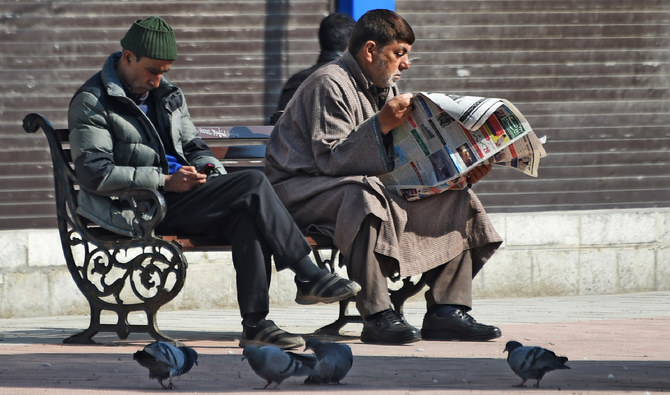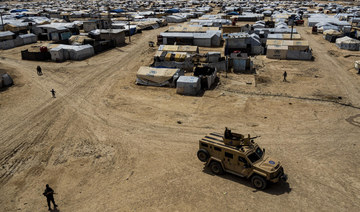NEW DELHI: An international media rights group and journalists in Indian-administered Kashmir on Tuesday condemned the closure a day earlier of a bureau of Kashmir Times (KT), the oldest newspaper in the disputed valley.
On Monday, the local estates department sealed the office of Kashmir Times, located in the Press Enclave of Srinagar. The department has not commented officially on why the office was shut down but officials have told media the owner of the building had died and KT no longer had the right to occupy the premises.
“We condemn the ongoing targeting and harassment of @AnuradhaBhasin_ and the Kashmir Times,” the Committee To Protect Journalists tweeted on Tuesday, referring to the editor of The Kashmir Times, Anuradha Bhasin. "Authorities must stop trying to silence independent and critical voices and should respect press freedom.”
On August 5, 2019, the Indian government stripped Kashmir, India’s only Muslim-majority state, of its autonomy, and imposed a crippling curfew and communications blackout and arrested dozens of local politicians.
Kashmir Times editor Bhasin, who had filed a petition in India’s Supreme Court challenging the cutting off of internet and telephone lines in the region, said authorities had sealed the paper’s office without giving prior notice.
“Without following any due process or serving any eviction notice, the estate department officials came and asked the people working inside to come out and locked the office," she told Arab News.
A few weeks ago, Bhasin said, she had been evicted in a similar fashion from her government-allotted residence in Hindu-majority Jammu.
“The administration not only evicted me without any notice but handed over my belongings to a new allottee,” she said.
“Why we are being targeted is because we continued to maintain the tradition of maintaining independence despite our sagging finances and constraints," Bhasin said. "We have continued to speak critically of the government’s policies and actions."
KT's closure follows a similar incident on Saturday when the local administration sealed the office of a leading news agency of the region, the Kashmir News Service.
Sehrish Asgar, chief of Kashmir’s department of information, did not reply to several calls and text messages from Arab News seeking comment. The estates department also declined comment on the record but one official, who requested anonymity, said:
“The building that we sealed was in the name of Ved Bhasin, and he expired four years ago. Since this building was allotted in someone else’s name, the government cancelled the allotment in the normal process … we served the notice in July itself and it is not an abrupt sealing.”
The Srinagar-based Kashmir Press Club (KPC) called the move a “vendetta” by the government against media in Kashmir.
“The actions are a clear vendetta against independent journalists and media houses. They don’t want media and independent voices to function freely,” Ishfaq Tantray, KPC general secretary, told Arab News.
KT was first established as a weekly in 1954 and became a daily newspaper in 1964, with two million subscriptions in the region currently.
Bhasin said the government had stopped posting advertisements in Kashmir Times since August last year in retaliation against the paper’s “challenge of the internet ban in the apex court.”
The paper thus had to shut down its print edition in both Jammu and Srinagar and had “paid the price" for being the "voice of the people,” she said.
Fahad Shah, editor of the Srinagar-based web magazine Kashmir Wala, said he had been questioned by authorities several times in recent months for his reportage in what were ongoing attempts to muzzle the press.
“This is just another way of intimidating the press,” he said on the closure of KT’s office.
Rights group, journalists condemn closure of Kashmir’s oldest newspaper
https://arab.news/4wwwv
Rights group, journalists condemn closure of Kashmir’s oldest newspaper
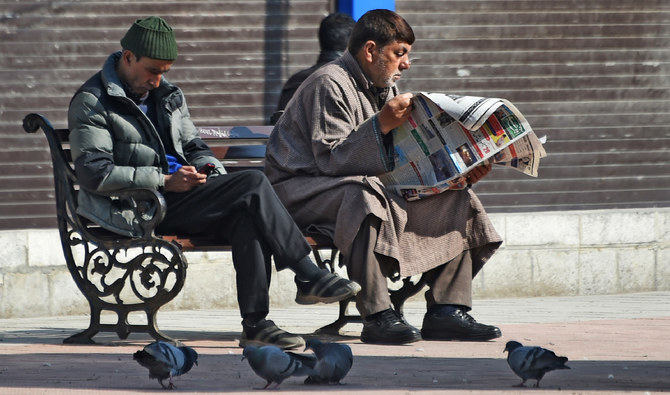
- Local estates department sealed the office of Kashmir Times on Monday saying it no longer had the right to occupy the premises
- Editor Anuradha Bhasin says authorities shut down the office without following due process or serving eviction notice
Key debt ratio resumes rise as global debt burden hits record $315 trillion, IIF says
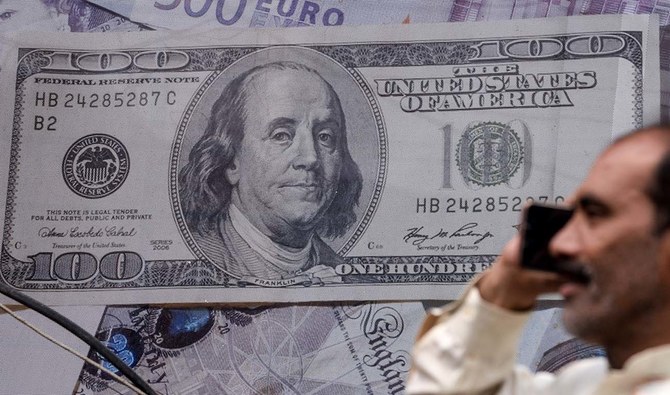
- The turnaround comes as dollar value of global debt surged by some $1.3 trillion quarter-on-quarter
- Pakistan is set to spend above 50 percent of its revenue on interest and Egypt more than 60 percent
NEW YORK: A key measure of world indebtedness has resumed its climb as global debt hit a record high of $315 trillion in the first quarter of the year, fueled by borrowing in emerging markets, the United States and Japan, a study showed.
The global debt-to-output ratio — a measure describing the ability of a borrower to pay back debt — rose to hit 333 percent after three consecutive quarters of decline, the Institute of International Finance (IIF) said on Tuesday in its quarterly Global Debt Monitor report.
The turnaround comes as the dollar value of global debt surged by some $1.3 trillion quarter-on-quarter.
Debt in emerging markets grew to a record of more than $105 trillion — having more than doubled over the past decade according to IIF data.
The largest contributors to the increase among emerging economies were China, India and Mexico. South Korea, Thailand, and Brazil posted the largest dollar value declines in overall debt among the subgroup, the data showed.
“Government budget deficits are still higher than pre- pandemic levels and are projected to contribute around $5.3 trillion to global debt accumulation this year,” the IIF said in a statement. “Rising trade friction and geopolitical tensions also present significant potential headwinds for debt markets.”
Interest rates were expected to have started declining in the United States by now but sticky inflation has seen the Federal Reserve stand its ground.
This has meant higher borrowing costs across the globe and, for many emerging markets, weakened currencies that further exacerbate the cost of servicing debt and “could once again bring government debt strains to the fore,” the IIF said.
Egypt and Pakistan are seen as the emerging economies where the interest expense on government debt will be highest through 2026, with Pakistan set to spend above 50 percent of revenue on interest and Egypt more than 60 percent.
Among developed economies, the United States and Japan saw debt rise the quickest, adding 17 percentage points and 4 percentage points respectively.
Japan is expected to continue to spend on average under 2 percent of government revenue in debt servicing through 2026, according to the IIF. In the US, the figure is expected to rise above 10 percent from the current 8 percent and brush against 12 percent in the same period.
Last month, the International Monetary Fund warned the US level of spending is “of particular concern” and “out of line with long-term fiscal sustainability.”
Key debt ratio resumes rise as global debt burden hits record $315 trillion, IIF says

- The turnaround comes as dollar value of global debt surged by some $1.3 trillion quarter-on-quarter
- Pakistan is set to spend above 50 percent of its revenue on interest and Egypt more than 60 percent
NEW YORK: A key measure of world indebtedness has resumed its climb as global debt hit a record high of $315 trillion in the first quarter of the year, fueled by borrowing in emerging markets, the United States and Japan, a study showed.
The global debt-to-output ratio — a measure describing the ability of a borrower to pay back debt — rose to hit 333 percent after three consecutive quarters of decline, the Institute of International Finance (IIF) said on Tuesday in its quarterly Global Debt Monitor report.
The turnaround comes as the dollar value of global debt surged by some $1.3 trillion quarter-on-quarter.
Debt in emerging markets grew to a record of more than $105 trillion — having more than doubled over the past decade according to IIF data.
The largest contributors to the increase among emerging economies were China, India and Mexico. South Korea, Thailand, and Brazil posted the largest dollar value declines in overall debt among the subgroup, the data showed.
“Government budget deficits are still higher than pre- pandemic levels and are projected to contribute around $5.3 trillion to global debt accumulation this year,” the IIF said in a statement. “Rising trade friction and geopolitical tensions also present significant potential headwinds for debt markets.”
Interest rates were expected to have started declining in the United States by now but sticky inflation has seen the Federal Reserve stand its ground.
This has meant higher borrowing costs across the globe and, for many emerging markets, weakened currencies that further exacerbate the cost of servicing debt and “could once again bring government debt strains to the fore,” the IIF said.
Egypt and Pakistan are seen as the emerging economies where the interest expense on government debt will be highest through 2026, with Pakistan set to spend above 50 percent of revenue on interest and Egypt more than 60 percent.
Among developed economies, the United States and Japan saw debt rise the quickest, adding 17 percentage points and 4 percentage points respectively.
Japan is expected to continue to spend on average under 2 percent of government revenue in debt servicing through 2026, according to the IIF. In the US, the figure is expected to rise above 10 percent from the current 8 percent and brush against 12 percent in the same period.
Last month, the International Monetary Fund warned the US level of spending is “of particular concern” and “out of line with long-term fiscal sustainability.”
UK prime minister summons university leaders over pro-Palestinian protests
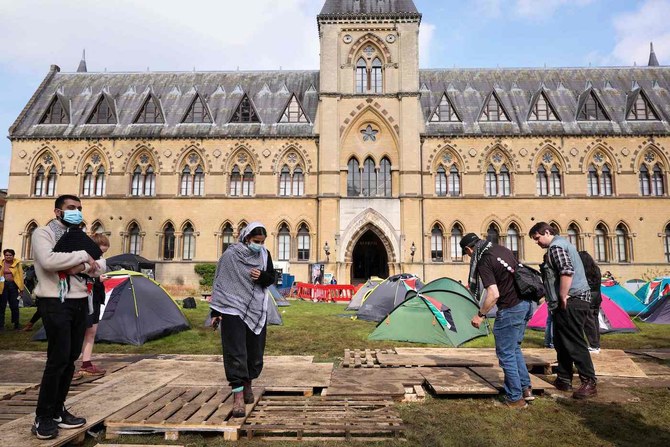
- Meeting to discuss antisemitism, ensuring Jewish students are safe
LONDON: UK Prime Minister Rishi Sunak is to summon the leaders of universities following pro-Palestinian protests that have taken place at campuses across the country.
The meeting will take place this week to discuss antisemitism on campuses and ensuring Jewish students are safe, Sunak told Britain’s Cabinet on Tuesday.
A spokesman for the prime minister said Sunak expected university leaders to take “robust action” in dealing with the protests, The Evening Standard reported.
“Our university campuses should be places of rigorous debate, but they should also be tolerant places where people of all communities, particularly Jewish students at this time, are treated with respect,” the spokesman said.
The “right to free speech does not include the right to harass people or incite violence,” he added.
The summons comes after British students set up pro-Palestinian protest encampments at Oxford and Cambridge campuses on Monday, in a show of solidarity with their American peers.
Cambridge University said its priority was the “safety of all staff and students” and that it was committed to freedom of speech.
“We will not tolerate antisemitism, Islamophobia and any other form of racial or religious hatred, or other unlawful activity,” a spokesperson said.
Pro-Palestinian protests have been taking place at US universities since April 17 and the protests have spread to Europe.
Police broke up student demonstrations in the Netherlands, Germany, and France on Tuesday as Israeli forces seized the main border crossing between Egypt and southern Gaza.
2,000 religious leaders attend Muslim World League conference in Kuala Lumpur

- MWL co-organized international gathering with the Malaysian government
- Prime Minister Anwar Ibrahim delivers speech during the conference
KUALA LUMPUR: More than 2,000 religious leaders and scholars from 57 countries gathered in Kuala Lumpur on Tuesday for a conference organized by the Muslim World League to discuss the role of religion in facilitating dialogue and peace initiatives.
The MWL, an international non-governmental Islamic organization founded in Saudi Arabia in 1962, organized the 2024 International Conference of Religious Leaders with Malaysia’s Department of Islamic Development.
The conference was inaugurated by Malaysian Prime Minister Anwar Ibrahim and MWL Secretary-General Sheikh Dr. Mohammad bin Abdulkarim Al-Issa.
“This religious conference will be an annual feature in Malaysia since it has proved successful in building an understanding and affinity among religions in the world, as well as in Malaysia,” Anwar said during his speech.
“In a conference like this, we can observe the things that need to be done and need to be improved among Muslims, Christians, Buddhists or Hindus. We want to listen to your advice, criticisms and suggestions.”
While about two-thirds of Malaysia’s more than 33 million population are Muslims, there are also large Buddhist, Hindu, and Christian minorities in the country.
“Religious leaders should take an active, effective and courageous role in promoting peace and justice. It is the duty of religious leaders to ensure that governance is guided by strong moral and ethical values,” Anwar said.
Al-Issa said the conference seeks to have a tangible impact.
“This international conference was attended by international, religious, political, intellectual, academic and media leaders. It is considered the first nucleus of a major breakthrough through a number of initiatives and programs around the world, aiming to enhance friendship and cooperation between nations and peoples,” he said.
“Our world is most in need of true solidarity, solidarity with a tangible impact, and is most in need of awareness of the threats threatening its global peace and the harmony of its diverse national communities in their religions and races.”
US repatriates two dozen Westerners from Syria Daesh camp
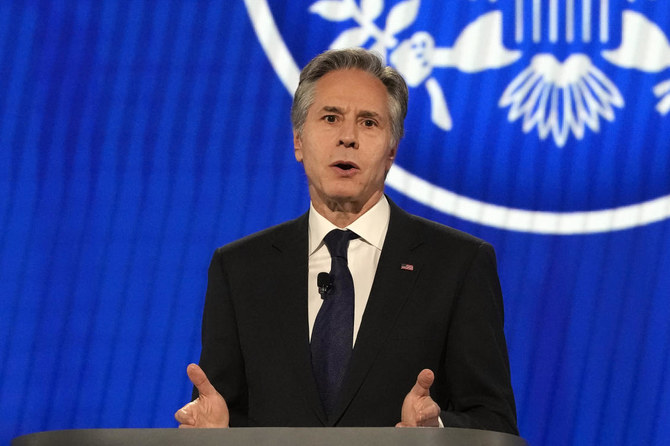
- In a complex operation involving US agencies, Kuwait and pro-US Kurdish fighters, the United States repatriated 11 US citizens
- The US also facilitated the repatriation of six Canadian citizens, four Dutch citizens, and one Finnish citizen
WASHINGTON: The United States announced Tuesday it had brought back two dozen Western citizens, half of them Americans, from a camp for Daesh prisoners in Syria, its largest-ever repatriation as thousands languish.
In a complex operation involving US agencies, Kuwait and pro-US Kurdish fighters, the United States repatriated 11 US citizens, including five minors, as well as a nine-year-old non-US sibling of an American, Secretary of State Antony Blinken said.
The United States in the same operation facilitated the repatriation of six Canadian citizens, four Dutch citizens, and one Finnish citizen, among them eight children, he said.
“This is the largest single repatriation of US citizens from northeast Syria to date,” Blinken said in a statement.
“The only durable solution to the humanitarian and security crisis in the displaced persons camps and detention facilities in northeast Syria is for countries to repatriate, rehabilitate, reintegrate and, where appropriate, ensure accountability for wrongdoing,” he said.
The United States has long pushed European governments to bring back nationals who went to fight for the Daesh group — or their children.
Most European countries have done so but slowly and despite initial reservations, especially in countries with a history of jihadist attacks at home such as France and Britain.
Blinken did not identify the people who were repatriated.
The New York Times, quoting unidentified sources, said they included an American woman, whose Turkish husband apparently took the family to Daesh territory and was later killed, and their nine children.
The Star Tribune of Minneapolis reported last week that a man who joined Daesh but then became a valuable informant was seeking the repatriation of two sons, one apparently the non-US citizen, to be raised by their grandparents in Minnesota.
The repatriations remain controversial in the United States as well, with the administration of former president Donald Trump in one prominent case insisting that a young woman seeking to return was not legitimately a US citizen.
The Kurdish-led Syrian Democratic Forces (SDF) helped US forces crush the Daesh group.
Five years after the extremists were ousted from their last territory, the SDF still holds more than 56,000 detainees with alleged or perceived links to the Daesh group.
Kurdish authorities have been asking foreign governments to repatriate their nationals but Western governments have responded slowly for fear of domestic backlash.


